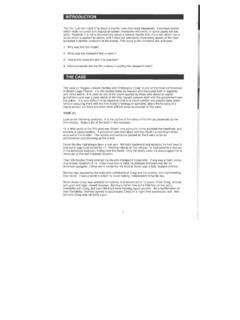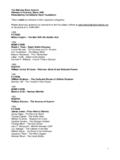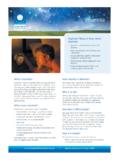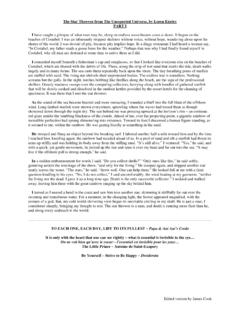Transcription of International Bible Lessons Commentary Exodus …
1 International Bible Lessons Commentary Exodus 12:1-14 New American Standard Bible International Bible Lessons Sunday, February 7, 2016 Parkhurst, Jr. The International Bible lesson (Uniform Sunday School Lessons Series) for Sunday, February 7, 2016, is from Exodus 12:1-14. Questions for Discussion and Thinking Further follow the verse-by-verse International Bible lesson Commentary . Study Hints for Discussion and Thinking Further discusses Questions for Discussion and Thinking Further to help with class preparation and in conducting class discussion: these hints are available on the International Bible Lessons Commentary website along with the International Bible lesson that you may want to read to your class as part of your Bible study. If you are a Bible student or teacher, you can discuss each week s Commentary and lesson at the International Bible lesson Forum.
2 [The Commentary below is expanded and revised from November 10, 2013] International Bible lesson Commentary Exodus 12:1-14 ( Exodus 12:1) Now the LORD said to Moses and Aaron in the land of Egypt, Though God first spoke to Moses at the burning bush on the mountain of God, Moses did not need to go to and from the mountain of God in order to hear from God. The Bible makes clear that Moses did not need to be in a special place or pray during a special time to hear from God. The eighth and ninth plagues of locusts and darkness may have already come upon the Egyptians by the time God speaks to Moses again in Exodus 12:1. Some commentators think the plague of darkness descended upon the Egyptians beginning the 10th day of the month, immediately before the first Passover was to be celebrated.
3 ( Exodus 12:2) This month shall be the beginning of months for you; it is to be the first month of the year to you. The name of the new first month is Nisan, which falls during the latter part of March or the first part of April, since the Jews use a lunar calendar. For this reason, the dates for Passover, Palm Sunday, and Easter vary from year to year. The previous Egyptian calendar would have made this month the seventh month of the year. With this first Passover, the Jews began a new calendar, a new calendar year, and a new way of life under the ceremonial Law of Moses before they entered the Promised Land. In a similar 2 way, after the resurrection of Jesus Christ Sunday became the first day of the week and our new calendar is divided into BC and AD.
4 ( Exodus 12:3) Speak to all the congregation of Israel, saying, On the tenth of this month they are each one to take a lamb for themselves, according to their fathers households, a lamb for each household. The new moon began a new month. In the Bible , the number 10 is a symbol for completion. On the 10th day, with the selection of the Lamb, the Hebrews began to make their Passover preparations. God s plagues in Egypt would be completed after He brought ten of them upon the Egyptians. Each person in the whole congregation was to be involved in the celebration of the Passover, and the head of each household would serve as a priest in the slaughter of the sacrificial lamb. ( Exodus 12:4) Now if the household is too small for a lamb, then he and his neighbor nearest to his house are to take one according to the number of persons in them; according to what each man should eat, you are to divide the lamb.
5 A family could be comprised of many households. At this time, the Hebrews lived in houses with doors and door posts instead of tents. Some households could be too small in numbers or too impoverished to acquire or use a whole lamb, so God made provision for everyone, rich and poor alike. They were told to join with their closest neighbor to buy the lamb or take a lamb from the flock to use. The lamb would be divided equally among each person at the feast. Centuries later, the rabbis would say that each person needed to eat some lamb and no piece of lamb eaten could be smaller than the size of an olive. ( Exodus 12:5) Your lamb shall be an unblemished male a year old; you may take it from the sheep or from the goats. The lamb to die sacrificially and be eaten was to be the best, without blemish; just as the Lamb of God was the Messiah who never sinned and the best Person that God the Father could give as a sacrifice for our sins.
6 At future Passover celebrations, the lamb would have been born near or shortly after the previous Passover (after the Hebrews began to celebrate the Passover in later years). It would be a male, who would represent males and females; just as the Lamb of God, the Son of God, died for the sins of males and females and represented males and females when He died for all. ( Exodus 12:6) You shall keep it until the fourteenth day of the same month, then the whole assembly of the congregation of Israel is to kill it at twilight. As God s judgment on the gods of Egypt and the Egyptians (who worshiped the sun as a god or idol), some believe the Egyptians were in darkness from the 10th day of the month to the 14th day of the month. Their sun god could not overcome the true God and give them light or save their firstborn children from death.
7 During this same time, the Israelites were caring for their livestock and their families in the light that God provided 3 for them alone. As night approached on the 14th day, the lamb would be slaughtered and eaten in the evening, which was the beginning of the 15th day. ( Exodus 12:7) Moreover, they shall take some of the blood and put it on the two doorposts and on the lintel of the houses in which they eat it. As the darkness of the evening approached, the Israelites obeyed Moses in faith and they put some blood from the slaughtered lamb or goat on the two door posts and the beam above the door (the lintel) of the house, but not on the threshold where it could be trampled underfoot. The blood would protect all those who stayed inside the house, so each one could be at peace on the inside of the house on the night of God s Passover.
8 They may not have understood why this was important, but their faithful obedience led to their salvation when the death angel passed over their homes and saw the blood of the lamb where God had commanded them to place it. ( Exodus 12:8) They shall eat the flesh that same night, roasted with fire, and they shall eat it with unleavened bread and bitter herbs. The lamb would be slaughtered and roasted immediately after it was slaughtered. In later years, the Hebrews would eat the lamb with unleavened bread in remembrance of how quickly they had to leave Egypt (before their bread had time to rise with yeast), and bitter herbs in remembrance of their bitter years of slavery in Egypt. Just as believers are saved from spiritual death by the blood of Christ, so they need to eat spiritually of the Lamb of God for spiritual life moment by moment.
9 ( Exodus 12:9) Do not eat any of it raw or boiled at all with water, but rather roasted with fire, both its head and its legs along with its entrails. God commanded the Hebrews to cook by roasting the entire lamb in haste. There was no time to remove the insides of the lamb (or properly dress it as a butcher would) before roasting it. Eating boiled lamb with its head and inner organs instead of roasting the lamb entirely might also have made people sick (or be sickening to look at and eat). Roasting the whole lamb might be considered a symbol of the fact that we are to receive into our lives and hearts Jesus Christ, the Lamb of God, wholly and completely as He is. Furthermore, we must receive the Lamb of God into our hearts on His terms, not on our terms or in our way but in His way, even though we may not completely understand His terms or His way.
10 ( Exodus 12:10) And you shall not leave any of it over until morning, but whatever is left of it until morning, you shall burn with fire. The Hebrews needed to learn complete trust in God for their salvation and daily provision. They needed to trust God for their daily bread, and obey God in order for them to receive all the blessings God wanted to give them. They were to burn all of the remains of the lamb and trust God for their next meal; just as later they were not to keep manna in the wilderness that they received overnight because it would spoil, except on the day before the Sabbath. Even though the Israelites may not have understood 4 everything God wanted them to do, they understood enough to obey God in faith. The remains of their meal was consecrated and eaten in faith; it was not to be trampled underfoot or thrown in the trash by Egyptians after the Israelites exited the land.















